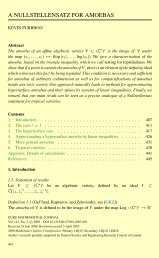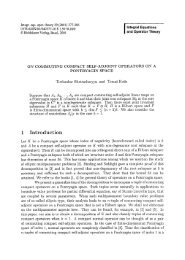computing lives - FTP Directory Listing
computing lives - FTP Directory Listing
computing lives - FTP Directory Listing
You also want an ePaper? Increase the reach of your titles
YUMPU automatically turns print PDFs into web optimized ePapers that Google loves.
A<br />
Computer Previous Page | Contents | Zoom in | Zoom out | Front Cover | Search Issue | Next Page M S BE<br />
aG<br />
F<br />
TECHNOLOGY NEWS<br />
Will HTML 5<br />
Restandardize<br />
the Web?<br />
Steven J. Vaughan-Nichols<br />
The World Wide Web Consortium is developing HTML 5 as a standard<br />
that provides Web users and developers with enhanced functionality<br />
without using the proprietary technologies that have<br />
become popular in recent years.<br />
In theory, the Web is a resource<br />
that is widely and uniformly<br />
usable across platforms. As<br />
such, many of the Web’s<br />
key technologies and architectural<br />
elements are open and<br />
platform-independent.<br />
However, some vendors have<br />
developed their own technologies<br />
that provide more functionality than<br />
Web standards—such as the ability to<br />
build rich Internet applications.<br />
Adobe System’s Flash, Apple’s<br />
QuickTime, and Microsoft’s Silverlight<br />
are examples of such proprietary<br />
formats.<br />
In addition, Google’s Gears and<br />
Oracle’s JavaFX—which the company<br />
acquired along with Sun Microsystems—have<br />
technologies that enable<br />
creation of offline and client-side Web<br />
applications.<br />
Although these approaches provide<br />
additional capabilities, they have<br />
also reduced the Web’s openness and<br />
platform independence, and tend to<br />
lock in users to specific technologies<br />
and vendors.<br />
In response, the World Wide Web<br />
Consortium (W3C) is developing<br />
HTML 5 as a single standard that provides<br />
Web users and developers with<br />
0018-9162/10/$26.00 © 2010 IEEE<br />
enhanced functionality without using<br />
proprietary technologies.<br />
Indeed, pointed out Google<br />
researcher Ian Hickson, one of the<br />
W3C’s HTML 5 editors, “One of our<br />
goals is to move the Web away from<br />
proprietary technologies.”<br />
The as-yet-unapproved standard<br />
takes HTML from simply describing<br />
the basics of a text-based Web to creating<br />
and presenting animations, audio,<br />
mathematical equations, typefaces,<br />
and video, as well as providing offline<br />
functionality. It also enables geolocation,<br />
a rich text-editing model, and<br />
local storage in client-side databases.<br />
The Web isn’t just about reading<br />
the text on the page and clicking<br />
on the links anymore, noted Bruce<br />
Lawson, standards evangelist at<br />
browser developer Opera Software.<br />
Added W3C director Tim Berners-<br />
Lee, “HTML 5 is still a markup language<br />
for webpages, but the really big<br />
shift that’s happening here—and, you<br />
could argue, what’s actually driving<br />
the fancy features—is the shift to the<br />
Web [supporting applications].”<br />
“HTML 5 tries to bring HTML into<br />
the world of application development,”<br />
explained Microsoft senior<br />
principal architect Vlad Vinogradsky.<br />
Published by the IEEE Computer Society<br />
“Microsoft is investing heavily in<br />
the W3C HTML 5 effort, working with<br />
our competitors and the Web community<br />
at large. We want to implement<br />
ratified, thoroughly tested, and stable<br />
standards that can help Web interoperability,”<br />
said Paul Cotton, cochair of<br />
the W3C HTML Working Group and<br />
Microsoft’s group manager for Web<br />
services standards and partners in<br />
the company’s Interoperability Strategy<br />
Team.<br />
At the same time though, Web<br />
companies say their proprietary technologies<br />
are already up and running,<br />
unlike HTML 5.<br />
Adobe vice president of developer<br />
tools Dave Story said, “The HTML 5<br />
timeline states that it will be at least a<br />
decade before the evolving efforts are<br />
finalized, and it remains to be seen<br />
what parts will be implemented consistently<br />
across all browsers.”<br />
In fact, while HTML 5 recently<br />
became a working draft, it’s not<br />
expected to become even a W3C candidate<br />
recommendation until 2012 or<br />
a final W3C standard until 2022.<br />
Nonetheless, some browser<br />
designers, Web authors, and websites—<br />
such as YouTube—are already adopting<br />
HTML 5 elements. For more<br />
APRIL 2010<br />
A<br />
Computer Previous Page | Contents | Zoom in | Zoom out | Front Cover | Search Issue | Next Page M S BE<br />
aG<br />
F<br />
13

















